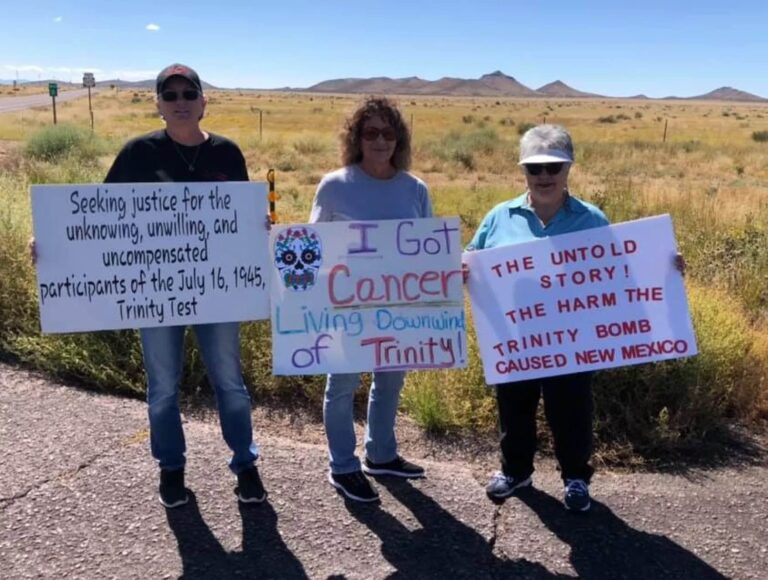We’ve created a way for you to help make a difference for those who have been exposed to radiation as a result of living in proximity of the many nuclear tests that have occurred over the past seven decades. An important Act, commonly referred to as RECA–or the Radiation Exposure Compensation Act– provides partial restitution to people suffering from illnesses and conditions as a result of the US nuclear program.
We hope you will sign this petition, addressed to US Representative Cliff Bentz, to show popular support for the continuation of this Act, which is due to expire in 2024.
The following fact sheet about the issue was created by Win Without War, a close Peace House ally in the struggle to rein in the risks associated with war and nuclear technologies.
S.1751 / H.R.4426: Radiation Exposure Compensation Act (RECA) Amendments of 2023
Sen. Crapo (R-ID), Sen. Lujan (D-NM), Rep. Leger Fernández (D-NM-03), Rep. Moylan (R-Guam)
Christopher Nolan’s “Oppenheimer” portrays the world’s first nuclear weapons test, the Trinity test in New Mexico on July 16, 1945. However, it does not address the thousands of individuals living near the test, and the many more thousands who lived “downwind” of later nuclear tests in Nevada, who suffer from cancers and other illnesses related to radioactive fallout from nuclear testing.
In 1990, Congress passed RECA with broad bipartisan support. It provides partial restitution to people suffering from illnesses linked to presumed radiation exposure from U.S. nuclear weapons testing and uranium mining. While this includes the scientists, federal employees, and veterans exposed by their participation in tests like Trinity, it does not include the families downwind of Trinity who unknowingly participated, as well as many other exposed communities.
RECA is set to expire in June 2024. If this happens, whole communities will lose crucial coverage, and many will never get the chance to apply. S.1751/H.R.4426 would extend RECA, rectify this gap in coverage for excluded communities, and strengthen support available to claimants.
Background
- From 1945 – 1962, the U.S. government conducted over 200 above-ground explosive nuclear tests. These tests spread radioactive fallout thousands of miles away from test sites.
- In the late 1940s, uranium mining in the United States dramatically expanded, driven by the production of nuclear weapons. Uranium workers, often Indigenous, were exposed to dangerous levels of radiation on the worksite.
- Hundreds of thousands of service members are classified as “atomic veterans,” and could have been exposed to radiation through nuclear testing and cleanup.
Impact
- Studies since the early 1900s showed a clear link between cancers/other deadly illnesses and radiation exposure from uranium mining These findings were confirmed by the US governments own studies on uranium miners beginning in the 1950s.
- Data from a 1997 National Cancer Institute study was used to show that testing caused tens to hundreds of thousands of cancers in populations downwind.
- The US government did not communicate the risks of these activities to uranium workers, civilians, and service members despite knowledge of these and other findings.
Coverage Under the Radiation Exposure Compensation Act
- Downwinders from certain counties in Arizona, Nevada, and Utah are eligible for $50,000.
- “Onsite participants” of atmospheric nuclear tests (military or civilian) are eligible for $75,000.
- Uranium miners, millers, and ore transporters who worked in the uranium industry from 1942 to 1971 are eligible for $100,000.
- RECA also provides funding for local health centers and nonprofit organizations to conduct cancer screenings and support individuals in filing RECA claims.
How would the RECA Amendments, S.1751 and H.R.4426, strengthen the program?
- Extend RECA by 19 years
- Expand the downwinder eligibility areas to all of ID, MT, CO, NM, Guam, NV, AZ, and UT
- Extend the uranium worker eligibility period and include additional types of uranium workers
- Update compensable illnesses
- Increase compensation to reflect the costs of care and inflation, including for past claimants
- Provide health care benefits


